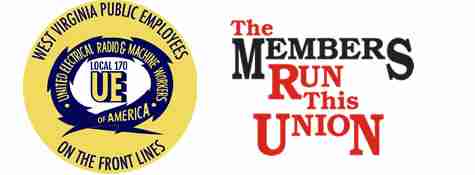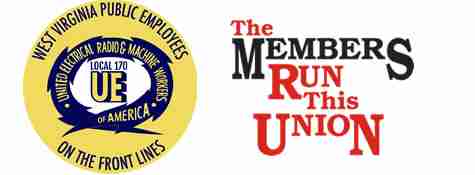Some questions and answers about our transition from payroll deduction to direct recurring dues payment, which we have no choice but to undertake. The days of paying the $20 monthly dues in two-week payroll deductions of $9.23 will come to an end after your June 4 paycheck.
Q: Why isn’t UE Local 170 sticking with payroll deductions as the preferred method of payment?
By a new law passed in the 2021 session of the Legislature, the state will no longer process payroll deductions. The law inserts a clause in four different chapters of the West Virginia State Code declaring, “No deductions or assignments of earnings shall be allowed for union, labor organization, or club dues or fees from the compensation of [employees].”
We don’t have a choice.
Q: When will that take effect?
The law takes effect June 17. The last paycheck with dues deductions will be the next paycheck, June 4.
Q: Why are you raising the dues to $20.98 per month? What is this “convenience fee”?
The leadership of this union faced a dilemma. Your leaders are also state workers, and they know your paychecks only stretch so far.
But remember this: Every business has expenses for offering credit/debit card payment. You pay that on every purchase at every store; you just don’t see it itemized on the receipt.
Our problem: When the state made that payroll deduction on our behalf, the union paid nothing. But when somebody pays by credit/debit card, the vendors who run our system take their cut. When we make this change and hundreds pay by card, that expense will pile up.
One way or another, members will have to foot that bill – by the convenience fee, higher dues or whatever. We hope for, and thank you for your understanding.
Q: Can we avoid that “convenience fee”?
Yes, as you may pay directly by check or money order. It’s a flat $20 by those methods.
Q: So we can pay by check or money order, correct?
Yes! You can pay monthly, quarterly, annually, any period you wish; just remember the dues are $20 per month for those not using a credit/debit card. That would be $60 quarterly, $240 annually, etc. You will not pay the “convenience fee” when you do this.
The downside: While we will issue reminders, you will have to keep up with renewing your membership, sending another check when appropriate.
Q: Can we pay by direct bank payment?
You may arrange with your bank for automatic payments, in which the bank sends us a check. Make those for a flat $20 a month, as there will be no “convenience fee.”
Q: For new members, when do our direct recurring payments take effect?
The way our system works, a new member’s initial card payment posts immediately, and recurring payments post a month later, no matter the day of the month.
Q: When do we have to act?
Existing members need to make their initial payments by July 1; otherwise, their membership will lapse. Members can join/rejoin the union at any time after that by making an initial payment.
Q: Can we pay directly from the website?
A: Yes. On our website, uelocal170.org, there is a link right at the top of the front page. You can’t miss it.
That takes you straight to an application page, in which you will enter your information. When you hit the “Submit” button (hit it ONCE and wait), you’ll go to a payment portal. Fill out the payment portal, including your card number, and hit “Submit Order.”
Q: Do we have to use the website?
A: No. You may call office manager Doug Smock at (304) 347-4396, and he can set you up. He usually works from 9 a.m. to 3 p.m. Monday through Friday, and returns voicemails promptly.
Q: As existing members, do we wait for July 1, or can we make that transition now? And would we lose money if we do it early?
We are prepared to take initial credit/debit card payments when you wish, and would love for existing members to beat the rush.
To avoid a duplicate payment, your initial payment will apply for the month of July. Our office will set your next payment to post August 1 and every month thereafter.
Therefore, your last payroll deduction would cover all the way through June.
Q: Was UE Local 170 prepared for this moment?
Yes. In late 2019, we silently launched our recurring card payment system. The first members to join that way were a group of Marshall University workers; a few others statewide followed. In April, our office ceased sending payroll deduction requests for new members, enrolling them by direct payment.
Q: Why did the Legislature do this to us?
Supporters of the bill, House Bill 2009, said they want the state to no longer serve as a “collecting agency,” and that the process is a poor use of state resources. Opponents said there was nothing wrong with the current system, and the bill was nothing more than retaliation against teachers’ unions. We didn’t get any respect, either.
A Senate committee inserted the deduction-banning clause into the original House bill, which was proposed by Geoff Foster, a Republican delegate from Putnam County. The Senate passed its amended version 20-13, with 2 Republicans joining all 11 Democrats in voting “no.” The House quickly concurred with that version, passing the bill 55-43 with 20 Republicans joining all 23 Democrats in voting “no.”
Governor Jim Justice signed the bill into law on March 31. The bill is being challenged in Kanawha County Circuit Court, but the timetable for resolution — or the result — is uncertain.

